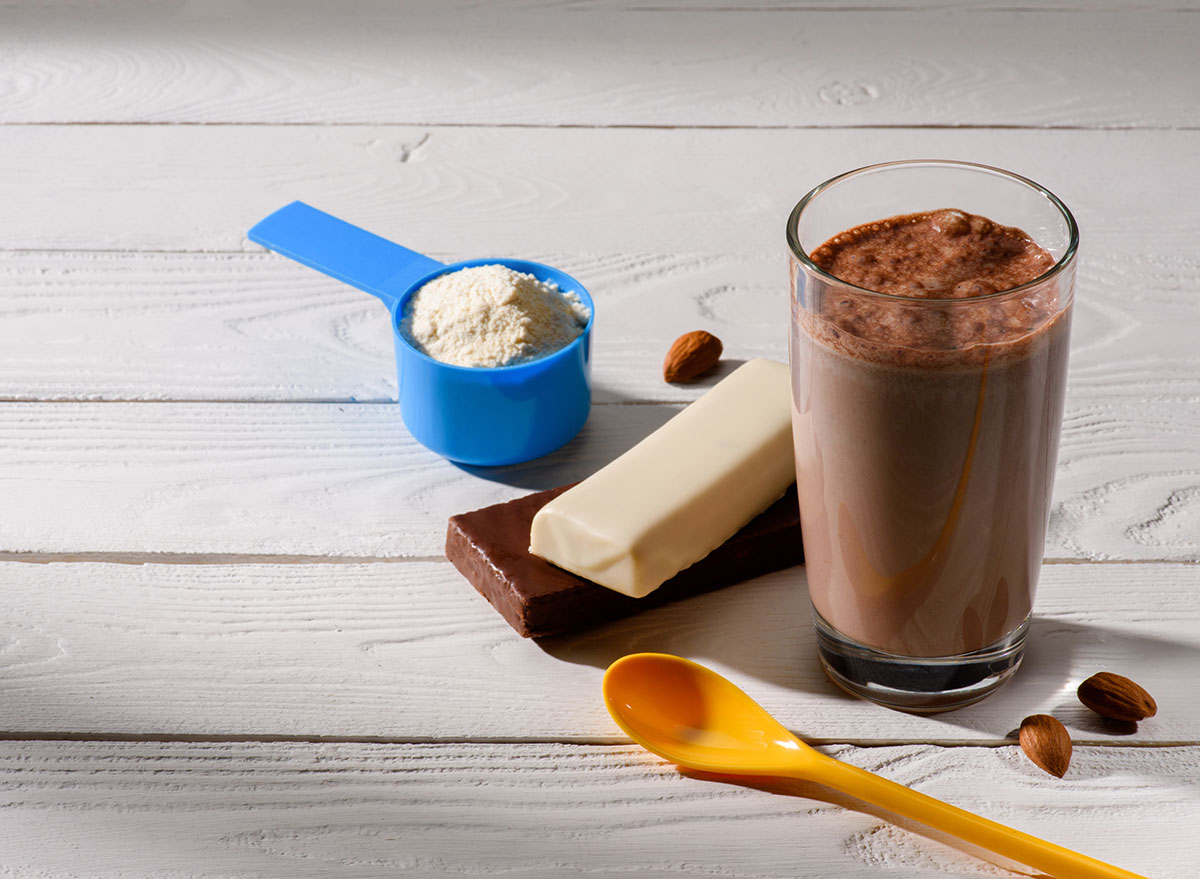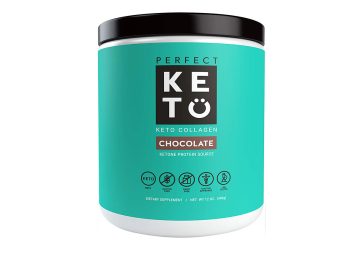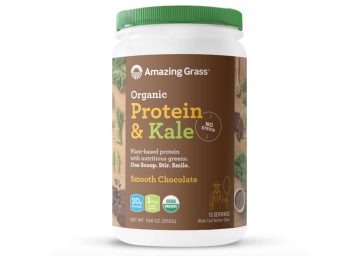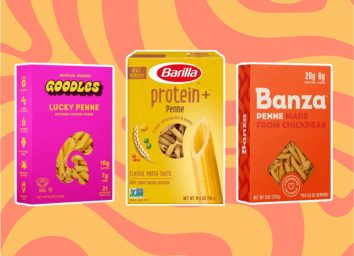Are Protein Shakes Good for Weight Loss? Health Experts Weigh In
Protein shakes seem like a convenient way to cut calories and lose weight, but are they really worth all the hype, especially when it comes to weight loss? As with most questions like this though, the answer depends.
When used as a meal replacement, protein shakes can absolutely help you achieve your weight loss goals. After all, a key component many keep in mind when trying to lose weight is creating a calorie deficit, and replacing a meal a day with a protein shake is an easy way to help achieve this goal.
"In general, high protein diets have a huge advantage when you're dieting because protein increases satiety," explains Bart Wolbers, researcher and chief science writer at Alexfergus.com. "Hence, the more protein-rich products you consume, the less hunger you'll experience, decreasing the chance that you'll grab some potato chips or Oreos in the evening."
Richard Wilcock, studio owner and personal trainer for Flagship Fitness, agrees, noting that of the four energy sources in our food—alongside carbohydrates, fat, and alcohol—protein, along with carbs, has the lowest calorie content per gram.
"Unfortunately," he says, "carbohydrates are very easily digested, so although they don't have a lot of calories per gram, you can eat a lot of them and soon be hungry again. Protein is the opposite. It's hard for us to digest, so when we do eat some, we will feel fuller for longer, making it easier to eat less in a day."
There's also the convenience factor to consider: a shake takes the guesswork out of making a healthy meal.
"Everything fits tidily in your Vitamix or preferred blender of choice, and all you need to do is fill it up, blend, then drink up," explains Dr. Nikola Djordjevic from LoudCloudHealth.com.
So, are protein shakes good for weight loss? Let's take a deeper dive.
First, do protein shakes make you bulk up?
Some people—women especially—worry that in consuming protein shakes, they'll lose weight but increase bulk. But our experts explain that this is far from the case. While Wilcock notes that protein shakes are indeed designed to help muscle growth, you actually need to do three things to really grow bulky muscles: lift heavy weights, get adequate recovery, and consume more protein. Increasing protein intake alone—whether in the form of food or shakes—will not suddenly turn you into Arnold Schwarzenegger.
"In essence, the body is lazy," says Wilcock. "A protein shake on its own is no different to eating a couple of chicken breasts. It can help with the sufficient nutrition part, but without the stimulus (gym work) and then the recovery, the body will carry on as normal."
"Protein just supports the exercise you are doing," adds Robert S. Herbst, personal trainer, and 19-time World Champion powerlifter. "If you do heavy squats, bench press, and curls and then eat protein, you will put on muscle mass. If you row for half an hour and then have protein, you will be lean and long." In fact, gaining this sort of lean, long muscle can actually help your weight loss goals over the long term.
"Protein builds muscle, and the bigger your muscles, the more calories your body can burn," explains Jamie Hickey, personal trainer and Nutritionist at Truism Fitness. "Consistently drinking protein shakes will set your system into a cycle of continuously burning calories. Simply put, protein shakes give your body the fuel it needs to burn fat."
And protein shakes can even help counteract the muscle loss that is a natural side effect of a calorie deficit.
"Higher protein intakes help you build more muscle and retain muscle if you're dieting," says Wolbers. "During a fat loss program, you'd ideally want to lose as much body fat as possible while minimizing muscle mass losses as much as possible as well—protein helps there."
What makes a good protein shake?
For San Francisco-based personal trainer, massage therapist, and nutrition coach Jonathan Jordan, it all comes down to what is in your shake: many can be filled with additives and sugars, so he recommends making your own, and to reap the full benefits of the fruits and veggies you add by also adding a healthy dose of fat.
"Many of the key nutrients in fruits and veggies and other healthy foods are fat-soluble," he says. "Without a little healthy fat to go along with them, you are literally, well, flushing them down the toilet instead of absorbing them."
But whether you're blitzing protein powder into a homemade smoothie or buying a ready-made shake off the shelf, there are a few things to keep in mind. You'll want to consider opting for whey protein, which Ana Reisdorf, MS, RD, CDE, notes has been associated with increased weight loss, as compared to other protein sources.
Monica Auslander Moreno, MS, RD, LD/N, nutrition consultant for RSP Nutrition, agrees, calling whey protein "the gold standard" for muscle growth.
Jordan, too, opts for whey protein, noting that he mixes up a protein shake with BioChem Whey Vanilla every morning before work, while Moretti loves Garden of Life Certified Organic Grass Fed Whey Protein powder, which contains probiotics, too. Johnson also prefers whey protein, specifically F-Factor 20/20.
According to Wilcock, it's also essential to choose a shake that's low in carbs; a high-carb or high-sugar shake could actually make it harder to lose weight. To this end, Caleb Backe, Certified Personal Trainer and Health Expert for Maple Holistics, recommends gluten-free, vegan Anthony's Premium Pea Protein.
When looking for a low-carb shake, it's important to steer clear of artificial sweeteners as a replacement for sugar. Heidi Moretti, MS, RD, a dietitian of over 20 years and owner of The Healthy RD, notes that not only are these sweeteners detrimental to your health, but they can also make you crave even more sugar.
She also notes that it's important to choose a shake that's rich in fiber: like Jordan, she jazzes up her shakes with added fruits and vegetables for even more fiber, as well as extra nutrients.
"The more fiber, the better the chances your protein shake will help you lose weight," she says.
It's also essential to be aware of how much protein is in your shake. For Wolbers, the ideal amount to consume on a daily basis is 2.2 grams of protein per kilogram of body weight if you're on a workout regimen. Reisdorf looks for 20 grams or more per serving of smoothie and 8 grams or less of sugar. And yes, it is possible to overdo it. Celebrity trainer Rebecca Louise recommends eating between 24 and 35 grams of protein in one go, no more.
"Overconsumption of protein can damage your kidneys over time, since they have to work extra hard to metabolize the protein," says Djordjevic. "Once you've hit your body's daily limit of protein, there are no benefits in consuming more of it."
Bottom line: Are protein shakes good for weight loss?
While our experts do believe that protein shakes can help with weight loss, they also agree that it's always best to rely on whole foods first. After all, protein shakes, despite their filling nature, may actually make you snack more.
"Protein shakes are not food, so they may not give you the satisfaction you would get from eating," Reisdorf says. "Also, it is easy to add a ton of extra calories via fruit or other additives to a protein shake. That won't help with weight loss either."
"Smoothies for weight loss can be challenging, as there are several studies that point to the effect of chewing and satiety," agrees NutriBullet's registered dietitian Sherene Chou. "Meaning, feeling satiated through the act of chewing and eating foods [has] evidence suggesting that chewing may decrease intake and self-reported hunger."
While most people, Wolbers notes, "are unable to consume all that protein from whole foods," the high levels of vitamins and minerals contained in whole foods make them a superior choice because losing weight increases your nutrient needs and "protein powders are good (and better than consuming inadequate protein), but not great."
"Overall, I would say that using protein shakes with moderation combined with a healthy diet loaded with fruits and veggies is the best way to lose weight," Djordjevic says.









